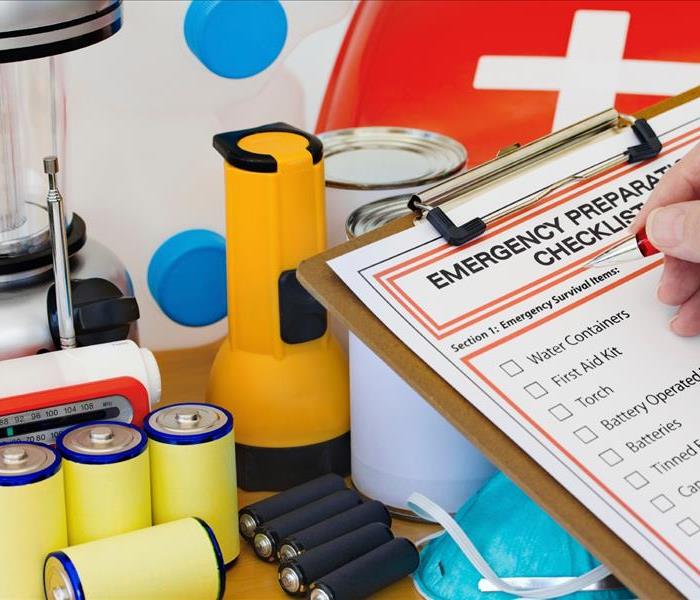Learn from Smokey
9/1/2023 (Permalink)
Wildfires are always burning somewhere in the United States. Dedicated men and women endure exhausting work, harsh living conditions, and long separations from friends and family to protect you and our nation's natural resources from the impacts of unwanted wildfires. The work of wildland firefighters benefits us all!
Help protect your home and stop the spread of wildland fires by following these eight steps.
1. Keep flammable objects (lawn mowers, oil or gas cans, propane tanks and wood piles) at least 30 feet away from the home at all times. Move flammables, such as lawn furniture and toys, during wildfire activity.
2. Keep roofs, gutters, decks and patios clear of leaves, pine needles or other flammables at all times.
3. Remove flammable mulch and vegetation within 5 feet of the home and replace with nonflammable material.
4. Remove tree or shrub branches that overhang within 10 feet of your house, roof or chimney.
5. Keep lawns watered and mowed, or if water-conserving, make sure debris is removed within 30 feet of home.
6. Trim tree limbs 10 feet above the ground (these are called ladder fuels).
7. Install 1/8-inch metal mesh screens over vents and under decks to prevent ember intrusion.
8. Go to Firewise.org or LivingWithFire.info to learn more about how to prepare your home for wildfire.
Make sure to always remember Smokey's Five Rules of Wildfire Prevention!
- Only you can prevent wildfires
- Always be careful with fire
- Never play with matches or lighters
- Always watch your campfire
- Make sure your campfire is completely out before leaving it
https://smokeybear.com/en/smokey-for-kids/preventing-wildfires
https://smokeybear.com/en/prevention-how-tos/equipment-use-and-maintenance/how-to-prepare-your-home-for-wildfire
https://smokeybear.com/en/about-wildland-fire/fighting-wildfires
Severe Weather Ready!
8/16/2023 (Permalink)
 Severe Weather can happen anywhere & anytime. Make sure you are prepared!
Severe Weather can happen anywhere & anytime. Make sure you are prepared!
Disaster can strike anywhere at anytime! That's exactly why here at SERVPRO we're open 24 hours a day, everyday of the year, ready to help you. With our Emergency Ready Profiles we can stay one step ahead of destruction and be prepared for anything that may come your way. No one plans for a disaster, but you can plan to be "Ready for whatever happens." Another great way to get yourself ready for emergencies is to build a disaster ready bag. Items to place in your kit include;
- Water
One gallon, per person, per day, for three days. Keep in air-tight, plastic containers that are easy to access. - Food
Three-day supply of non-perishable foods. Don’t forget food for your pets! Consider finding an emergency food guide for Eating and Cooking When the Power Goes Out. - First Aid
In an emergency, you or a family member may be injured. An adequate First Aid kit can keep a minor injury from turning major. You may want to take a basic first aid class though the Red Cross or online through the National Safety Council. Basic First Aid Items in Your Kit should include:- Sterile gloves
- Sterile dressings
- Soap and antibiotic towelettes
- Antibiotic ointment
- Adhesive bandages in a variety of sizes
- Eye wash solution
- Thermometer
- Prescription medications you take every day
- Prescribed medical supplies such as glucose and blood pressure monitoring equipment and supplies
- First Aid book
- Non-prescription drugs (aspirin or non-aspirin pain reliever, anti-diarrhea medication, antacid)
- Sanitation
Adequate sanitation is a significant environmental concern after a disaster. When sewer pipes are damaged or the sanitation system goes off-line, entire communities, including people and habitats are at risk. Be prepared to take care of your waste for the same period of time as you’ve prepared food and water.- Toilet paper
- Soap
- Feminine supplies
- Plastic garbage bags & ties
- Plastic bucket with tight lid
- Chlorine bleach
- Supplies for pet waste
- Tools & Supplies
What you need can vary greatly based on where you live, the type of disaster you expect and your family unit. Talk with your family about items they wouldn’t want to be without in an emergency. Here are some basic items that most people will need in a disaster:
- Wrench to turn off gas and water lines
- Cups, plates and utensils
- Light source
- Radio (get one that is USB powered or buy a battery-operated radio and extra batteries)
- Manual can opener or a utility knife
- Small fire extinguisher
- Pliers
- Duct tape
- Matches in a waterproof container
- Plastic storage container to keep everything in one place




 24/7 Emergency Service
24/7 Emergency Service
